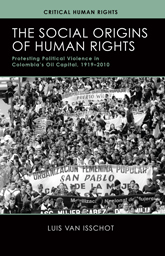The Social Origins of Human Rights
Protesting Political Violence in Colombia’s Oil Capital, 1919–2010
Luis van Isschot
Critical Human Rights
Steve J. Stern and Scott Straus, Series Editors
“A major contribution to scholarship on Colombian violence and human rights, and a substantial contribution to the historiography on human rights more generally.”
—Nancy Appelbaum, Binghamton University
Human rights activism is often associated with international organizations that try to affect the behavior of abusive states around the globe. In Barrancabermeja, Colombia, argues Luis van Isschot in The Social Origin of Human Rights, the struggle for rights has emerged more organically and locally, out of a long history of civil and social organizing. He offers deep insight into the lives of home-grown activists in a conflict zone, against the backdrop of major historical changes that shaped Latin America in the twentieth century.
Built by Standard Oil in 1919, and home to the largest petroleum refinery in the country, Barrancabermeja has long been a critical battleground in Colombia’s armed conflict. One of the most militarized urban areas on earth, the city has been a regional base for the Colombian armed forces as well as for leftist guerrillas and a national paramilitary movement. In the midst of a dirty war in which the majority of victims were civilians, urban and rural social movements from Barrancabermeja and the surrounding area came together to establish a human rights movement. These frontline activists called upon the Colombian state to protect basic human rights and denounced the deeper socioeconomic inequalities they saw as sources of conflict. Through close study of the complex dynamics at work in Barrancabermeja, van Isschot shows how the efforts we describe as “human rights” activism derive in large part from these lived experiences of authoritarianism, war, poverty, and social exclusion. Through its social and historical approach, his analysis both complements and challenges the work of scholars who look at rights issues primarily through a legal lens.
 Luis van Isschot is an assistant professor of the history of modern Latin America at the University of Toronto. He has worked and conducted research in Latin America, Canada, the United States, and the Great Lakes region of Africa. From 1995 to 2005, he worked for Peace Brigades International (PBI), which provides unarmed protective accompaniment to human rights and social activists in conflict areas.
Luis van Isschot is an assistant professor of the history of modern Latin America at the University of Toronto. He has worked and conducted research in Latin America, Canada, the United States, and the Great Lakes region of Africa. From 1995 to 2005, he worked for Peace Brigades International (PBI), which provides unarmed protective accompaniment to human rights and social activists in conflict areas.
Praise
“Luis van Isschot has written a compelling, powerful, and critical history of human rights movements in Colombia. . . . This excellent and politically inspirational book will provoke important discussions.”
—Hispanic American Historical Review
“A remarkable contribution to the field of twentieth-century Colombian history. . . . This book is a masterful narrative that interweaves and integrates the history of Colombia’s iconic oil capital, Barrancabermeja, with the history of human rights in Colombia.”
—Journal of Latin American Studies
“Invites us to advance our analysis of human rights movements across Latin America in ways that take into account the social and cultural origins of activists and struggles and the intense regionalization of violence, collective action, and state presence.”
—Latin American Perspectives
“Groundbreaking.”
—The Latin American Review of Books
“What truly distinguishes van Isschot’s work from other scholarly work on human rights activism in Latin America is the emphasis on the local level and the exploration of the state’s dual role of systematizing human rights while also undermining them.”
—Choice
“A nuanced history of human rights organizing in one of the most contentious and violent cities in Colombia, documenting the deep roots of such activism in the social struggles of the past century. Luis van Isschot illuminates the critical role human rights organizations play in making violence known, and more importantly, analyzing the causes and consequences of such violence. Essential reading for anyone concerned with Colombia’s past and present.”
—Winifred Tate, Colby College
Publicity and Press Kit Resources
Click here for current & upcoming UW Press events
Download high resolution cover, color
Download high resolution cover, b/w
Download high resolution author photo, color
Download high resolution author photo, b/w
All images are at least 2.25 inches at 300 dpi wide; current title covers are a minimum of 1500 px wide/6 inches wide at 300 dpi. Please contact us if you need a custom size.
Media & bookseller inquiries regarding review copies, events, and interviews can be directed to the publicity department at publicity@uwpress.wisc.edu or (608) 263-0734. (If you want to examine a book for possible course use, please see our Course Books page. If you want to examine a book for possible rights licensing, please see Rights & Permissions.)
|

June 2015
LC: 2014035662 JC
328 pp. 6 x 9
10 b/w photos,
4 maps
|

